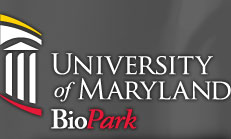
The University of Maryland (UM) BioPark announced today that Ocular Proteomics, LLC (OPL), a startup biotechnology company leveraging a new class of biomarkers found in vitreous fluid of the eye to more accurately diagnose and treat retinal diseases, has recently relocated to Building One of the BioPark from Baltimore County. Led by world-renowned and internationally respected retinal surgeon Bert M. Glaser, M.D., OPL is a spin out of the National Retina Institute. OPL’s move to the BioPark comes on the heels of the company’s $1.2 million dollar Small Business Innovation in Research (SBIR) phase 2 grant from the National Institutes of Health. In its new space, OPL will be conducting the research phase of a multi-center clinical trial, which will include 200 patients with macular degeneration.
Said Jim Hughes, President, Research Park Corporation, University of Maryland Baltimore, “The BioPark has once again attracted an innovative and important start-up to our location. We’re pleased to welcome Dr. Glaser and Ocular Proteomics to our roster of commercial tenants. Dr. Glaser founded Ocular Proteomics to use personalized medicine to drastically change the way blinding diseases are diagnosed and treated.”
“For us, the BioPark offers a convenient location, access to the top faculty and resources located on the University of Maryland Baltimore campus and the best environment Baltimore has to offer for a company looking for built-out laboratories,” said Dr. Glaser, Chief Scientific Officer, Ocular Proteomics. “It truly feels as though this location was tailor made for a startup company like Ocular Proteomics. We’re happy to be a part of a culture that embraces entrepreneurship and are looking forward to leveraging all of the available resources into exciting discoveries for ocular health.”
About Ocular Proteomics
OPL is committed to preserving and improving sight for the millions of people with eye diseases by leveraging a new class of biomarkers found in vitreous fluid of the eye to more accurately diagnose and treat retinal diseases through personalized medicine. OPL’s Diagnostic Vitreous Proteome (DVP) is a technology for measuring biochemical signals in the eye to assist in more accurate diagnoses and treatments. For the first time, doctors will benefit from applying ocular biochemistry to design an exacting and individualized program of drug therapy. The company’s proprietary protein panel measures activated receptor molecules and other markers in the human vitreous. Over the past five years, OPL has built the world’s largest vitreous bank from in-office sampling of patients that range widely in both disease, and disease state.
OPL is investigating the Vitreous Proteome and building a companion diagnostic that measures the health of the retina, and disease progression/regression. This is accomplished by measuring activated receptor levels in the vitreous fluid of the eye via Reverse Phase Protein Microarray technology. A unique aspect of OPL’s technology is the ability to determine the active state of the retina.
While other technologies have focused on various biomarkers, only OPL has developed the technology to examine the active state of relevant proteins in the eye. This is accomplished by testing for phosphorylated receptors shed into the vitreous, which indicates receptor activation and the pathway(s) involved in the disease process. To decide on the appropriate individualized therapy for the patient, it is of critical importance to establish which pathways are active (“turned on”) and which are not (“turned off”) in the retina. Only in this way can physicians best determine impending disease activity, elucidate a lack of therapeutic response, coordinate combination treatment or properly individualize therapy for the patient. This data will significantly differentiate the DVP from its competitors, demonstrate significant value and have a direct impact on the therapeutic treatment paradigm of multiple vitreo-retinal diseases. For more information, visit www.ocularproteomics.com.
About Dr. Glaser
Dr. Glaser is an internationally respected retinal surgeon who has been in practice for over 25 years. After devoting ten years as Professor of Ophthalmology and Vitreoretinal Surgery and as Director for the Center for Vitreoretinal Research at The Wilmer Eye Institute of The Johns Hopkins School of Medicine, Dr. Glaser established his own retina treatment center, which has evolved into The National Retina Institute. Under Dr. Glaser’s direction, NRI has become one of the most preeminent retina research and treatment centers in the world.
Dr. Glaser’s record of entrepreneurship dates back to the early 1990s when he developed, operated, and subsequently sold an eye care company that became the largest eye care provider in the region. However, Dr. Glaser’s construction of sustainable businesses goes beyond ophthalmology, as demonstrated with the successful growth of Midnight Express Boats. From starting as a garage based company, Midnight Express has expanded to supply interception and interdiction boats to U.S. Homeland Security, The U.S. Navy, and other Navies around the world. The management of these contracts, especially international ones, require stringent adherence to many regulatory requirements. This, along with the over 20 years of success at NRI, demonstrates Dr. Glaser’s ability to grow small companies into large thriving companies that make a large impact in their field.
About the University of Maryland BioPark
The UM BioPark is a biomedical research park on the campus of the University of Maryland, Baltimore. The BioPark welcomes additional life science companies to join its growing scientific community of emerging, high-growth life science tenants and University of Maryland (UM) translational research and clinical treatment centers. For early-stage to mature bioscience companies, the BioPark offers a sophisticated laboratory and office environment on the UM’s vibrant academic medical center campus. Community members are commercializing new drugs, diagnostics and devices and advancing biomedical research. Learn more about BioPark tenants at http://www.umbiopark.com/tenants.aspx.
